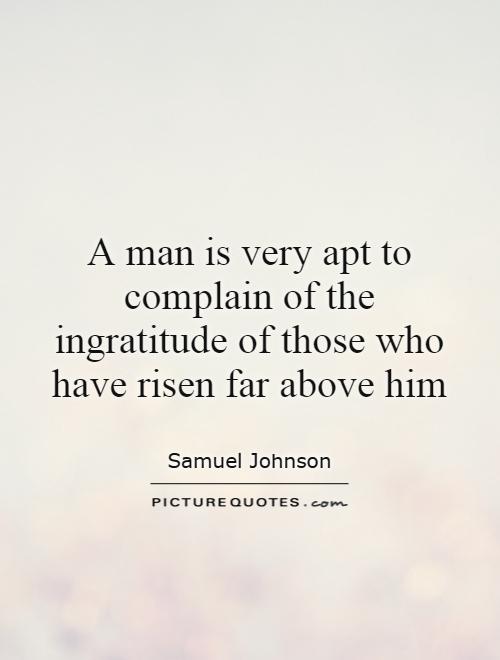A man is very apt to complain of the ingratitude of those who have risen far above him

A man is very apt to complain of the ingratitude of those who have risen far above him
Samuel Johnson, the renowned English writer and lexicographer, was no stranger to the concept of ingratitude. Throughout his life, Johnson encountered numerous individuals who he believed had risen far above him, only to show ingratitude towards him. Johnson's own struggles with poverty and rejection undoubtedly colored his views on this subject, leading him to make the observation that "a man is very apt to complain of the ingratitude of those who have risen far above him."One of the most famous examples of Johnson's experience with ingratitude was his relationship with his former pupil and friend, David Garrick. Garrick, a successful actor and theater manager, had once been a struggling young man who Johnson had taken under his wing and mentored. However, as Garrick's star rose in the theatrical world, he began to distance himself from Johnson, leading the latter to feel a sense of betrayal and ingratitude. Johnson's feelings of resentment towards Garrick were evident in his writings and conversations, where he often lamented the ingratitude of those who had once been his friends and proteges.
In addition to his personal experiences, Johnson's observations on ingratitude were also influenced by his broader views on human nature. Johnson believed that ingratitude was a common failing of mankind, rooted in selfishness and a lack of moral character. He saw ingratitude as a symptom of the inherent flaws of human nature, which often led individuals to prioritize their own interests over the well-being of others.
Despite his own struggles with ingratitude, Johnson also recognized the importance of forgiveness and understanding in dealing with those who had wronged him. He believed that holding onto feelings of resentment and bitterness towards others only served to harm oneself, and that it was better to let go of past grievances and move on with one's life.












 Friendship Quotes
Friendship Quotes Love Quotes
Love Quotes Life Quotes
Life Quotes Funny Quotes
Funny Quotes Motivational Quotes
Motivational Quotes Inspirational Quotes
Inspirational Quotes